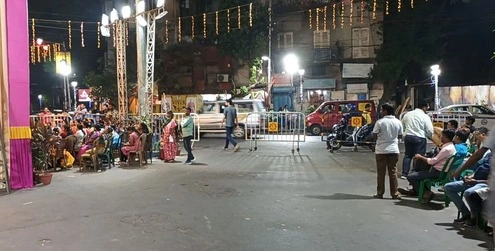By Sujit Bhar
Beneath Kolkata’s festive surface, the struggles and frustrations of ordinary citizens are all too often swept aside. In the city, where ancient buildings are torn down to make way for high-rise constructions, the transformation of West Bengal under the Trinamool Congress (TMC) government feels more destructive than progressive.
Collusion between real estate promoters and TMC officials has led to the rampant replacement of heritage sites with towering apartments, a metaphor for the city’s decaying moral compass. In Nabanna, the state’s secretariat, discussions on commerce and industrial development are virtually non-existent. Instead, the government channels energy into consolidating power, appeasing party cadres, and feeding a seemingly insatiable appetite for money. For the average citizen, there are few employment opportunities or signs of economic growth, leaving an atmosphere of helplessness and simmering resentment.
A chilling reminder of this neglect came with the brutal rape and murder of a young medical trainee at RG Kar Medical College. The protests by junior and some senior doctors had the potential to bring down the entire government. As of now, though, that mass movement has virtually been erased from the generally short-lived memories of the public. As the Durga pujas entered the fray, and it gave way to the Jagaddhatri Puja, people were immersed in this “utsav” (celebration), and the gruesome murder was washed from the memories, and jousting for political patronage of pujas took precedence, leaving questions of justice and safety unanswered.
While TMC’s power brokers celebrate, small business owners suffer. As I roamed the lanes adjacent to Harish Chatterjee Street, the road on which Chief Minister Mamata Banerjee lives, I found no sign of any remorse, or even a whisper of resentment at the gaudy display of “utsav”. Nikhil, a once-loyal TMC supporter, who runs a tea stall near Mamata’s residence, recalls how his shop has been moved from one end of the road to another, just to accommodate the “pandals” that these pujas had been housed in. Nobody has bothered to compensate for his loss in business. “Ekhane ar kichu hobe na (nothing will happen here ever again),” he says.
Nearby, Utpal, a former tailor who lost an arm in a bus accident, two years back, struggles to secure a prosthetic limb from the state government, despite repeated pleas for assistance. For him, TMC’s promises of compassion ring hollow. Till the accident, he believed Mamata was the epitome of compassion. He tried every way to approach the powers, mainly through Kartik Banerjee, Mamata’s brother, who holds the area close to his heart, to try and get one of those advanced prosthetic arms that would allow him to resume his tailoring trade. “Every time I approach him (Kartik), he points to another guy and tells me: ‘tell him your problem and I will take care of it’,” Utpal says. “The other guy explains how this cannot be done, how there is no money for an expensive prosthetic arm for me,” Utpal laments.
The fact that the party is minting millions in front of their eyes—party boys breaking up old houses on Harish Mukherjee Road (a road adjacent to Harish Chatterjee Street), raising high-rise residential buildings—is not lost on the local people. “If there was a decent Opposition in the state and if elections were held now in that scenario, TMC would have no chance of winning,” says Neel Mukherjee, a long-time resident of the area who left the city for Mumbai in desperation and has now returned for a few days.
The CPI(M) is a shadow of its former self, while the BJP, despite vocal criticisms, appears suspiciously compliant with TMC’s agenda. Local BJP leader Suvendu Adhikari’s fiery rhetoric belies his powerlessness, as the party fails to mount a meaningful challenge to the ruling TMC. The recent bail granted to TMC leader Anubrata Mondal, embroiled in cattle smuggling allegations, highlights the murky relationship between state and judiciary. The grounds for his release—a convoluted argument over untranslated documents—were laughable. The central government’s investigating agencies, far from ensuring accountability, seem caught in a bureaucratic game that benefits the well-connected.
I walked past a Jagaddhatri idol on Kalighat Road, a road adjacent to Harish Mukherjee Road, I spotted Kartik sitting with some of his “followers”, basking in the attention of many. I have known Kartik for a while, and he has always presented a very decent side of him. “Hullo, how are you?” he asked. “When did you come here (to Kolkata)?” I told him and asked how things were. “All the jhamela (trouble) is over now,” he said frankly. “Things are back to normal. Didi is on a high.” “So the pujas have been a success this year? We in Delhi had been thinking there would be issues…” I said. “No problem at all. All you hear in Delhi, dada, are all coloured by the BJP. There is no truth in any of it,” he answered, smiling.
As long as the intricate political dance between the BJP and the TMC continues, the common man’s needs will remain sidelined. For West Bengal, real change remains elusive, hidden beneath a cycle of deception and self-interest that shows no signs of breaking before the next election in 2026.


